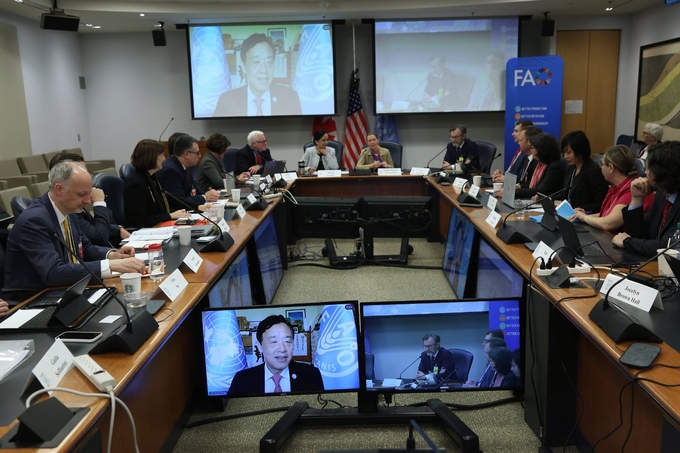May 21, 2025 | 18:55 GMT +7
May 21, 2025 | 18:55 GMT +7
Hotline: 0913.378.918
May 21, 2025 | 18:55 GMT +7
Hotline: 0913.378.918

The Director-General thanked Canada and the United States for their ongoing support in his video address to the 8th edition of FAO's North America Regional Conference.
The climate crisis, gender equality and innovation are three priorities that should guide the cooperation between Canada, the United States, and the Food and Agriculture Organization of the United Nations (FAO) over the next two years.
This was the message from FAO Director-General QU Dongyu on Tuesday as he addressed the opening of the 8th edition of the Informal North America Regional Conference (INARC), which takes place in Ottawa and is being hosted by the Canadian government.
Qu began by thanking the two governments for their ongoing support since the inception of FAO, nearly 80 years ago, before expressing his gratitude for their support in the approval of a 5.6 percent increase to FAO’s regular program budget – the first such increase in 12 years.
“Considering the difficult economic conditions globally, it is worth noting that your support to FAO has been historically high over the past two years. To me, this shows that confidence in FAO is being restored, and is an undeniable recognition of our important contribution to global food security,” Qu said via video link from FAO’s headquarters in Rome.
The Director-General reminded the conference about his efforts to improve transparency in FAO’s governance arrangements, as well as his focus on re-creating FAO as “an agile, action-oriented fit-for-purpose Organization, capable of innovating and finding solutions to the ongoing global challenges.”
Such challenges include persistently high food prices, economic slowdowns, and the climate crisis, which disproportionally affect the most vulnerable. The continuing war in Ukraine, as well as conflicts and increasing humanitarian crises – such as in Gaza, Afghanistan, Haiti, the Sudan, and Yemen - are also of “great concern.”
Together with its partners, FAO is providing technical and agricultural support to bring relief, rebuild, and restore agricultural production.
“FAO is committed to pursuing new innovative pathways to transform global agrifood systems to be more efficient, more inclusive, more resilient, and more sustainable,” Qu said.
Its Four Betters - better production, better nutrition, a better environment and a better life - are the pillars of the FAO Strategic Framework 2022-31 and the pathway for us to ensure that no one is left behind, the Director-General said.
Cooperation priorities
The Informal North America Regional Conference takes place every two years. While it is not an official part of the FAO governing body process, it offers a vital opportunity for in-depth discussions with two of FAO’s most active and supportive Members.
According to the Director-General, the collaboration between FAO, Canada and the United States over the next two years should focus on three key areas: Rural transformation and reduced inequalities, especially gender equality; science, innovation and technology; and climate, biodiversity and the environment.
Empowering youth and women is imperative for agrifood systems transformation and sustainable rural development, Qu said.
This is the reasoning behind the launch by FAO of two reports dedicated to gender equality and inclusion – “The Status of Women in Agrifood Systems” and “The Unjust Climate” – which provide new data and evidence on the need to invest in gender equality. In this context, FAO has established an Office of Youth and Women to mainstream this important work, Qu said.
Innovation, together with science and technology, are seen as key accelerators to enhance effectiveness and impact and are now front and center in all of FAO’s efforts, Qu said.
Finally, the idea that transformed agrifood systems can be a solution to the climate crisis is behind FAO’s Global Roadmap on Achieving SDG2 without breaching the 1.5C threshold. The roadmap provides a holistic strategy for countries to make policy decisions and innovative actions to address the issues of hunger and climate.
FAO’s work is focused on supporting Members to build resilience so that especially the most vulnerable can prevent, and cope with, crises and shocks, particularly women, youth, Indigenous Peoples, and marginalized communities – all areas where Canada and the United States have been supportive, Qu said. This also includes FAO’s commitment to the One Health agenda to help, detect and respond to emerging disease threats globally.
“We rely on the ongoing support from Canada and the United States to continue building these already strong and longstanding partnerships,” Qu said. “Together, as partners, we can realize the original vision of your leaders after World War II for establishing the Food and Agriculture Organization and for defining our mandate and mission for a world free from hunger and malnutrition.”
(FAO)

(VAN) Attempts to bring down the price of the Japanese staple have had little effect amid a cost-of-living crisis.

(VAN) Fourth most important food crop in peril as Latin America and Caribbean suffer from slow-onset climate disaster.

(VAN) Shifting market dynamics and the noise around new legislation has propelled Trouw Nutrition’s research around early life nutrition in poultry. Today, it continues to be a key area of research.

(VAN) India is concerned about its food security and the livelihoods of its farmers if more US food imports are allowed.

(VAN) FAO's Director-General emphasises the need to work together to transform agrifood systems.

(VAN) Europe is facing its worst outbreak of foot-and-mouth since the start of the century.

(VAN) The central authorities, in early April, released a 10-year plan for rural vitalization.